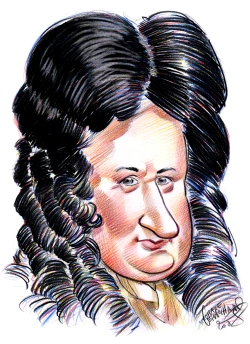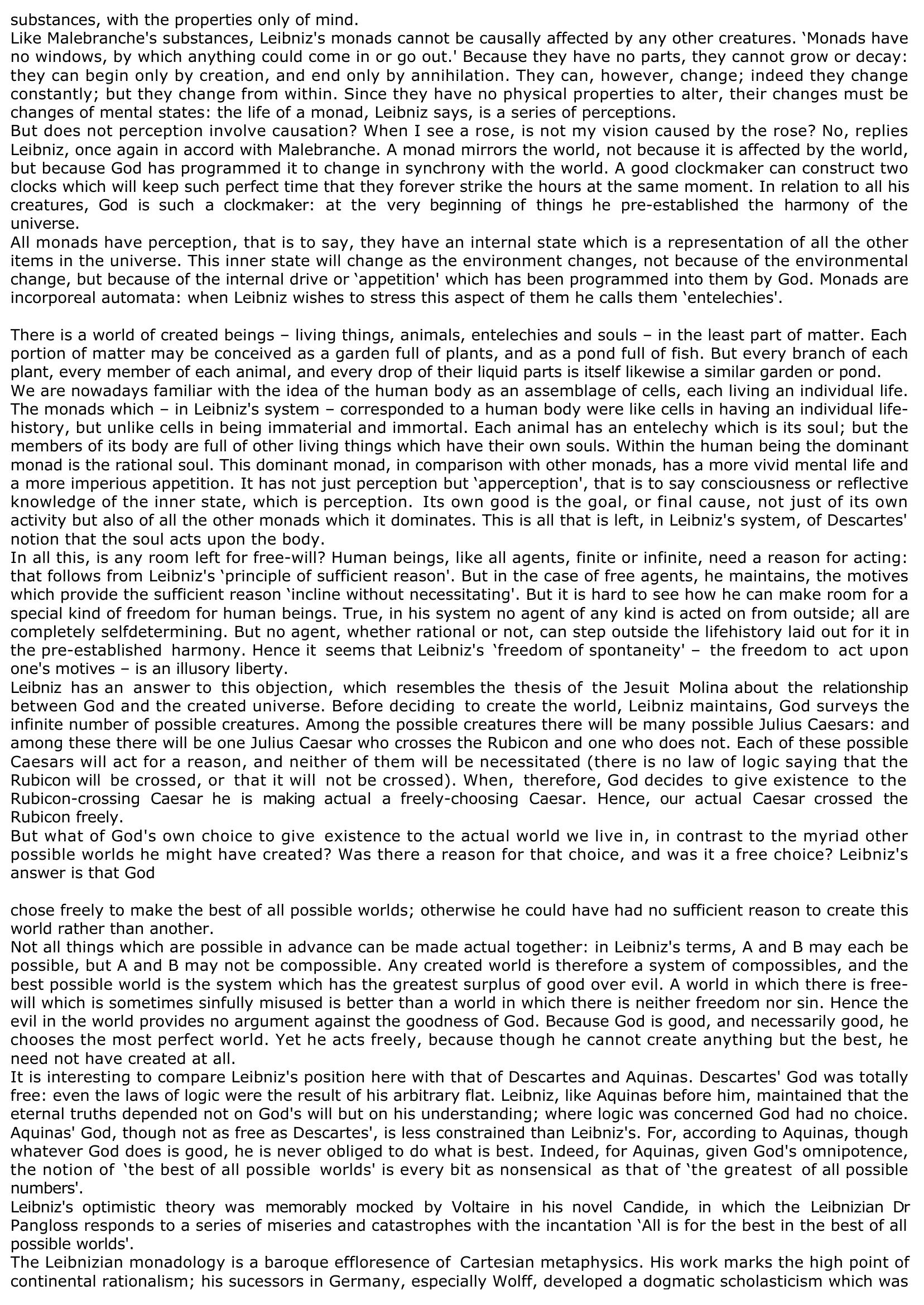Encyclopedia of Philosophy: Leibniz
Publié le 09/01/2010

Extrait du document

Both Malebranche and Spinoza were important influences on the thinking of Gottfried Wilhelm Leibniz. Leibniz was born in 1646, the son of a professor of philosophy at Leipzig university. He started to read metaphysics in early youth, and by the age of thirteen became familiar with the writings of the scholastics, to which he remained much more sympathetic than most of his contemporaries. He studed mathematics at Jena and law at Altdorf, where he was offered, and refused, a professorship at the age of twenty-one. He entered the service of the Archbishop of Mainz, and on a diplomatic mission to Paris met many of the leading thinkers of the day, and came under the influence of Descartes' successors. There, in 1676, he invented the infinitesimal calculus, unaware of Newton's earlier but as yet unpublished discoveries. On his way back to Germany he visited Spinoza, and studied the Ethics in manuscript.

«
substances, with the properties only of mind.Like Malebranche's substances, Leibniz's monads cannot be causally affected by any other creatures.
‘Monads haveno windows, by which anything could come in or go out.' Because they have no parts, they cannot grow or decay:they can begin only by creation, and end only by annihilation.
They can, however, change; indeed they changeconstantly; but they change from within.
Since they have no physical properties to alter, their changes must bechanges of mental states: the life of a monad, Leibniz says, is a series of perceptions.But does not perception involve causation? When I see a rose, is not my vision caused by the rose? No, repliesLeibniz, once again in accord with Malebranche.
A monad mirrors the world, not because it is affected by the world,but because God has programmed it to change in synchrony with the world.
A good clockmaker can construct twoclocks which will keep such perfect time that they forever strike the hours at the same moment.
In relation to all hiscreatures, God is such a clockmaker: at the very beginning of things he pre-established the harmony of theuniverse.All monads have perception, that is to say, they have an internal state which is a representation of all the otheritems in the universe.
This inner state will change as the environment changes, not because of the environmentalchange, but because of the internal drive or ‘appetition' which has been programmed into them by God.
Monads areincorporeal automata: when Leibniz wishes to stress this aspect of them he calls them ‘entelechies'.
There is a world of created beings – living things, animals, entelechies and souls – in the least part of matter.
Eachportion of matter may be conceived as a garden full of plants, and as a pond full of fish.
But every branch of eachplant, every member of each animal, and every drop of their liquid parts is itself likewise a similar garden or pond.We are nowadays familiar with the idea of the human body as an assemblage of cells, each living an individual life.The monads which – in Leibniz's system – corresponded to a human body were like cells in having an individual life-history, but unlike cells in being immaterial and immortal.
Each animal has an entelechy which is its soul; but themembers of its body are full of other living things which have their own souls.
Within the human being the dominantmonad is the rational soul.
This dominant monad, in comparison with other monads, has a more vivid mental life anda more imperious appetition.
It has not just perception but ‘apperception', that is to say consciousness or reflectiveknowledge of the inner state, which is perception.
Its own good is the goal, or final cause, not just of its ownactivity but also of all the other monads which it dominates.
This is all that is left, in Leibniz's system, of Descartes'notion that the soul acts upon the body.In all this, is any room left for free-will? Human beings, like all agents, finite or infinite, need a reason for acting:that follows from Leibniz's ‘principle of sufficient reason'.
But in the case of free agents, he maintains, the motiveswhich provide the sufficient reason ‘incline without necessitating'.
But it is hard to see how he can make room for aspecial kind of freedom for human beings.
True, in his system no agent of any kind is acted on from outside; all arecompletely selfdetermining.
But no agent, whether rational or not, can step outside the lifehistory laid out for it inthe pre-established harmony.
Hence it seems that Leibniz's ‘freedom of spontaneity' – the freedom to act uponone's motives – is an illusory liberty.Leibniz has an answer to this objection, which resembles the thesis of the Jesuit Molina about the relationshipbetween God and the created universe.
Before deciding to create the world, Leibniz maintains, God surveys theinfinite number of possible creatures.
Among the possible creatures there will be many possible Julius Caesars: andamong these there will be one Julius Caesar who crosses the Rubicon and one who does not.
Each of these possibleCaesars will act for a reason, and neither of them will be necessitated (there is no law of logic saying that theRubicon will be crossed, or that it will not be crossed).
When, therefore, God decides to give existence to theRubicon-crossing Caesar he is making actual a freely-choosing Caesar.
Hence, our actual Caesar crossed theRubicon freely.But what of God's own choice to give existence to the actual world we live in, in contrast to the myriad otherpossible worlds he might have created? Was there a reason for that choice, and was it a free choice? Leibniz'sanswer is that God
chose freely to make the best of all possible worlds; otherwise he could have had no sufficient reason to create thisworld rather than another.Not all things which are possible in advance can be made actual together: in Leibniz's terms, A and B may each bepossible, but A and B may not be compossible.
Any created world is therefore a system of compossibles, and thebest possible world is the system which has the greatest surplus of good over evil.
A world in which there is free-will which is sometimes sinfully misused is better than a world in which there is neither freedom nor sin.
Hence theevil in the world provides no argument against the goodness of God.
Because God is good, and necessarily good, hechooses the most perfect world.
Yet he acts freely, because though he cannot create anything but the best, heneed not have created at all.It is interesting to compare Leibniz's position here with that of Descartes and Aquinas.
Descartes' God was totallyfree: even the laws of logic were the result of his arbitrary flat.
Leibniz, like Aquinas before him, maintained that theeternal truths depended not on God's will but on his understanding; where logic was concerned God had no choice.Aquinas' God, though not as free as Descartes', is less constrained than Leibniz's.
For, according to Aquinas, thoughwhatever God does is good, he is never obliged to do what is best.
Indeed, for Aquinas, given God's omnipotence,the notion of ‘the best of all possible worlds' is every bit as nonsensical as that of ‘the greatest of all possiblenumbers'.Leibniz's optimistic theory was memorably mocked by Voltaire in his novel Candide, in which the Leibnizian DrPangloss responds to a series of miseries and catastrophes with the incantation ‘All is for the best in the best of allpossible worlds'.The Leibnizian monadology is a baroque effloresence of Cartesian metaphysics.
His work marks the high point ofcontinental rationalism; his sucessors in Germany, especially Wolff, developed a dogmatic scholasticism which was.
»
↓↓↓ APERÇU DU DOCUMENT ↓↓↓
Liens utiles
- Encyclopedia of Philosophy: al-Ghazali, Abu Hamid
- Encyclopedia of Philosophy: al-Farabi, Abu Nasr
- Encyclopedia of Philosophy: Alexander, Samuel
- Encyclopedia of Philosophy: Alexander of Hales
- Encyclopedia of Philosophy: Alexander of Aphrodisias

































